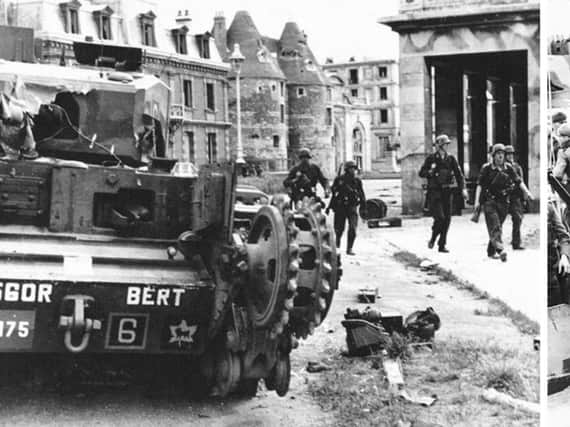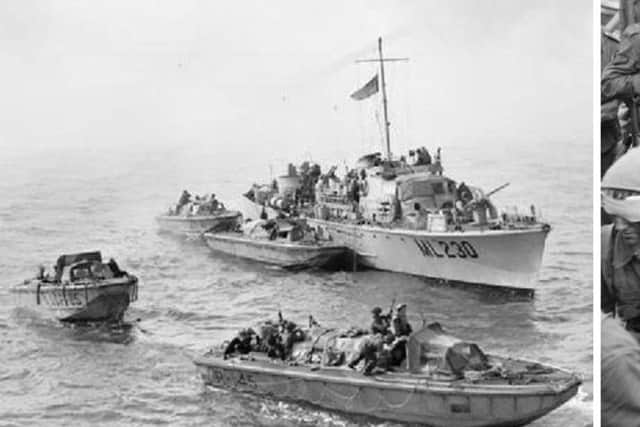Disaster at Dieppe due to poor planning and enemy readiness


Last week I set the scene for “Operation Jubilee” and described how the pressure to mount a “Second Front” compelled the Allies to do something to divert German forces from their relentless advance on Russia’s heartland.
I also recounted how the thousands of young Canadian soldiers camped out in South East England were desperate to go into action and how pub brawls vented their frustrations. Lorne Lauzen was one of the many quieter Canadians. He met Sussex lass Joan Tanner when he offered her his seat on a bus home from the cinema. Romance blossomed and the couple married even though the war must soon part them. Joan recalls encountering some of Lauzen’s comrades on what was to be the couple’s final weekend together. “They said ‘at last we’re going to use all our training… we’re going to Dieppe’”.
Advertisement
Hide AdAdvertisement
Hide AdLorne was killed at Dieppe. For a long time Joan was bitter about her husband’s death but in later years she came to believe that the raid was key to the success of D-Day. In particular to the creation of the Mulberry artificial harbours that by-passed the need to assault heavily defended ports. Lord Louis Mountbatten, head of Combined Operations, perhaps spoke for her when he declared that the victory on D-Day was won on the beaches of Dieppe.


Joan Tanner should not have been told that Dieppe was the destination for an Allied raid. It was a serious security lapse. Notwithstanding, it must have been obvious to the Germans that Dieppe was a prime target; it was duly strongly fortified and manned by determined defenders.
Most of the Canadians embarked at Newhaven. The landing craft protected by eight destroyers formed up in the Channel and steamed south. First to land from 04.30 were the flanking forces. They met with mixed fortunes. The vessels carrying No. 3 Commando ran into a German coastal convoy bound for Dieppe. Escorting E-Boats attacked the British craft and sank two whilst disabling an SGB (Steam Gun Boat). When the commandos landed at Berneval they were pinned down by German fire and most were killed or forced to surrender.
No.4 Commando under Lord Lovat were luckier. They landed west of Dieppe near Varengeville and knocked out their target, a six-gun German battery. Most of the men got back to their landing craft and their action was counted the major success of “Jubilee”. Captain Patrick Porteous won the VC for his part in it. Indeed, had this been the night’s only mission it would have been hailed as a great Allied coup.
Advertisement
Hide AdAdvertisement
Hide AdCanadians landed in force on “Blue Beach” near the little resort of Puys, east of Dieppe. Delays meant it was light when they arrived. Once on the beach the men came under withering fire and could not get over the high sea wall; of the 556 men in the Royal Regiment of Canada, 200 were killed and 264 captured.


The South Saskatchewan Regiment landed at Pourville, designated “Green Beach”. They got beyond the beach but had to hastily retreat when German reinforcements arrived on bicycles. Some Canadians swam out to landing craft but 84 dead remained on Green Beach along with 89 others captured. The prisoners included Lt. Col. Cecil Merritt, who ended the war in Colditz Castle. Survivor’s accounts of Merritt’s bravery led to him winning the Victoria Cross.
The main landing descended into horrific chaos as machine gun fire from the cliffs at either end of the beach lashed into the exposed troops. More fire poured from fortified buildings on the sea front. The Churchill tanks upon which so much confidence was riding arrived late and then found it difficult to traverse the steep shingle. Just 15 of the 58 tanks that left England got over the seawall only to face impassable concrete blocks on the esplanade that left them sitting ducks. All the tank crews became casualties. Radios failed to function and reinforcements went in blind to face a hail of enemy fire. At 9.40am the decision was made to withdraw - a painfully slow process that cost many more dead and wounded.
All the Allied soldiers, sailors and airmen at Dieppe fought with great bravery against a resolute enemy entrenched in prepared positions overlooking the beaches. It was the Dieppe Raid planners who hugely underestimated the task of capturing a German-held port in a frontal assault. They believed that the element of surprise combined with firepower from air and sea and the deployment of tanks would ensure success. They got it badly wrong and the Canadians paid the price; around 4,000 were killed or captured. The Germans suffered just 591 casualties.
Advertisement
Hide AdAdvertisement
Hide AdAfter Dieppe many more Canadians came to Sussex to prepare for D-Day. They stayed in the same places once occupied by their ill-fated countrymen. On 1st September 1944 the 2nd Canadian Division marched into Dieppe to be greeted by the townsfolk with cheers, flowers and gifts of calvados and cider. The Germans had fled. A just atonement for the tragedy of 19th August 1942.